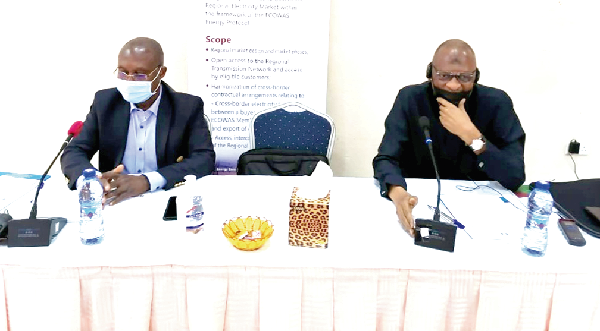
Communication experts build capacity in electricity regulation
Communication experts of electricity regulatory authorities from 11 West African countries have built their capacity in the fundamentals of regulation and also been introduced to the ECOWAS regional electricity market at a workshop organised by the ECOWAS Regional Electricity Regulatory Authority (ERERA) in Akosombo in the Eastern Region.
It was attended by 13 participants from Ghana, Cote d’Ivoire, Burkina Faso, Togo, Benin, Nigeria, Niger, Senegal, The Gambia, Liberia and Sierra Leone.
It formed part of an ongoing technical assistance by the European Union (EU) to ERERA to improve governance in the energy sector in the ECOWAS region.
Among the objectives of the workshop was to enhance the knowledge of the communication experts on the ECOWAS regional electricity market — gender mainstreaming, development, transmission services and information management.
Implementation
A senior expert in energy regulation under the EU-funded technical assistance programme of ECOWAS, Mrs Ifey Ikeonu, called on member states to scale-up efforts towards the implementation of the sub-region’s energy gender mainstreaming policy.
She said since the passage of the policy in 2017, little had been done by governments of member states to ensure its full implementation.
Policy
The policy includes making energy services easily available and affordable to improve the standard of living of the people.
It is also to ensure that specific interests of the people are taken into account in the development of energy projects, while harmonising policy and legal regulatory frameworks of member states.
Mrs Ikeonu, who is also an energy policy and regulation consultant, further explained that the policy had been designed to provide policy makers with instrumental and human rights-based indicators and rigorous arguments to align energy interventions with principles of gender.
“Gender mainstreaming is making sure that gender is incorporated in all aspects of energy policies and interventions,” she said, adding: “Gender mainstreaming ensures that proper assessments are made for the use of energy, the sources of energy, productive uses and payment in planning and executing of energy projects.”
Mrs Ikeonu, who is a former Chairperson of ERERA, said although ECOWAS was one of the first regions on the continent to put in place a robust framework for gender mainstreaming in the energy sector, “the major challenge remains with implementation”.
